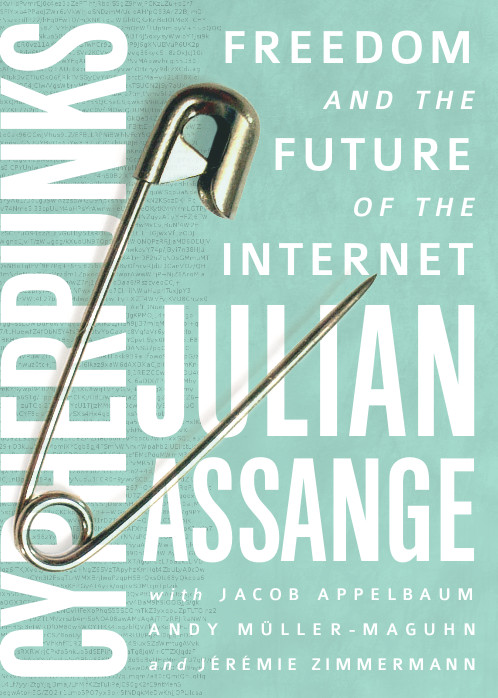Julian Assange, et al.: Cypherpunks: Freedom and the Future of the Internet (2012)
Filed under book | Tags: · activism, anonymity, censorship, code, cryptography, cypherpunk, encryption, free software, hacking, internet, internet activism, politics, privacy, software, surveillance, transparency, wikileaks

Cypherpunks are activists who advocate the widespread use of strong cryptography (writing in code) as a route to progressive change. Julian Assange, the editor-in-chief of and visionary behind WikiLeaks, has been a leading voice in the cypherpunk movement since its inception in the 1980s.
Now, in what is sure to be a wave-making new book, Assange brings together a small group of cutting-edge thinkers and activists from the front line of the battle for cyber-space to discuss whether electronic communications will emancipate or enslave us. Among the topics addressed are: Do Facebook and Google constitute “the greatest surveillance machine that ever existed,” perpetually tracking our location, our contacts and our lives? Far from being victims of that surveillance, are most of us willing collaborators? Are there legitimate forms of surveillance, for instance in relation to the “Four Horsemen of the Infopocalypse” (money laundering, drugs, terrorism and pornography)? And do we have the ability, through conscious action and technological savvy, to resist this tide and secure a world where freedom is something which the Internet helps bring about?
The harassment of WikiLeaks and other Internet activists, together with attempts to introduce anti-file sharing legislation such as SOPA and ACTA, indicate that the politics of the Internet have reached a crossroads. In one direction lies a future that guarantees, in the watchwords of the cypherpunks, “privacy for the weak and transparency for the powerful”; in the other lies an Internet that allows government and large corporations to discover ever more about internet users while hiding their own activities. Assange and his co-discussants unpick the complex issues surrounding this crucial choice with clarity and engaging enthusiasm.
With Jacob Appelbaum, Andy Müller-Maguhn, and Jérémie Zimmermann
Publisher OR Books, New York/London, November 2012
ISBN 9781939293008
192 pages
Interview with Assange where he also speaks about the book (video, DemocracyNow!, 29 November 2012)
Commentary (The Guardian)
Review (Cryptome.org)
PDF (PDF)
PDF (EPUB)
PDF (MOBI)
PDF (torrent, all 3 formats)
Video of Assange’s TV show The World Tomorrow interview the book is based on, Part 1, Part 2 (Youtube.com)
Shanthi Kalathil, Taylor C. Boas: Open Networks, Closed Regimes: The Impact of the Internet on Authoritarian Rule (2003)
Filed under book | Tags: · censorship, e-government, human rights, internet, mass media, politics

As the Internet diffuses across the globe, many have come to believe that the technology poses an insurmountable threat to authoritarian rule. Grounded in the Internet’s early libertarian culture and predicated on anecdotes pulled from diverse political climates, this conventional wisdom has informed the views of policy makers, business leaders, and media pundits alike. Yet few studies have sought to systematically analyze the exact ways in which Internet use may lay the basis for political change.
In Open Networks, Closed Regimes, the authors take a comprehensive look at how a broad range of societal and political actors in eight authoritarian and semi-authoritarian countries employ the Internet. Based on methodical assessment of evidence from these cases—China, Cuba, Singapore, Vietnam, Burma, the United Arab Emirates, Saudi Arabia, and Egypt—the study contends that the Internet is not necessarily a threat to authoritarian regimes.
Publisher Carnegie Endowment for International Peace, Washington DC, 2003
Global Policy Books series
ISBN 0870031945, 9780870031946
217 pages
Julia Schramm: Klick mich: Bekenntnisse einer Internet-Exhibitionistin (2012) [German]
Filed under book | Tags: · biography, blogging, germany, internet, pirate party, politics

Politologin, Publizistin, Piratin, Provokateurin, Privilegienmuschi, Post-Gender-Feministin, Politikerin.
Sie leben im Netz. Sie kommen aus dem Netz. Sie kennen die echte Welt und haben noch eine Welt hinter dem Monitor, mit allen Geschichten, allen Bildern, allem Wissen der Menschheit. Von dort aus erobern sie die Wirklichkeit. Die Kinder des digitalen Zeitalters sitzen mittlerweile in den Parlamenten und stehen mächtigen Firmen vor. Wir müssen sie kennenlernen. Julia Schramm – die, die aus dem Internet kommt – erzählt ihre Geschichte. Was sie macht. Wie sie lebt. Wie sie denkt.
»Mein Name ist Julia und ich lebe im Internet. Ich bin da ziemlich glücklich, habe Freunde, die ich nur digital kenne und abschalten kann, wann ich will. Ich kann im Internet alles sein: Mafiaboss, Barbie, Hitler, Hotelbesitzer und ein kleines grünes Krokodil. Am Computer bin ich Gott. Und dabei fühle ich mich großartig – großartig böse, kalt und berechnend. Bereits in jungen Jahren, mit 13 oder 14, war ich mir über die schier endlosen Möglichkeiten der Identitätskonstruktion bewusst. Das Internet war der Ort, wo ich alles zum ersten Mal erlebte: Liebe, Sex und Verrat. Aufklärung, Freiheit und Politik. Dort rede, lache, weine und denke ich. Denn ich bin ein Kind des digitalen Zeitalters, ich bin die, die aus dem Internet kommt. Und das ist meine Geschichte.«
Publisher Albrecht Knaus, Muenchen, Random House, 2012
ISBN 3641081920, 9783641081928
208 pages
FAIL – Prominent Pirate Party Politician Goes After Book Pirates (Torrentfreak)
Pirate Party Member Insists on Copyright for Book (Spiegel)
author
wikipedia
publisher
google books

